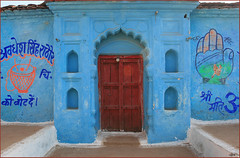
The birth of this blog coincides with the counting day of 2009 Indian Elections. It's been about 60 years since independence. Although 40% of the voters are first-time voters in these elections, the outcome of the counting is unlikely to reveal new leaders on the face of the led-by-old country.
The median age of India is 23. But the young - are they independent thinkers? Many of the urban youth are. They are cosmopolitan, newly-rich/newly-middle-class and optimistic. Sadly, they only sometimes come out on streets, not as a sustained force. In reality I believe their last-generation-Indian education did not teach much cooperation, but overwhelmingly and invariably focused on competition. As a result, there are more arguments on each topic than there are number of people. There is no youth-led/youth-populated political party.
But even this population of uncooperative but optimistic urban youth is a small minority - let's say 20% of all the youth. I say 20% because that is the ratio of the work-force in India that is trained at all for the work it does - the other 80% never had any vocational training. The youth in rural areas and a lot of urban youths are entangled within the cobwebs of the past -- the cobwebs that are growing thicker by the day.
I can go on for hours, but I don't have that many. So I summarize the cobwebs below, in hope I will dwell upon each of them for the time they (do not) deserve in the future:
- old cobweb 1: Caste System, communalism and divisive politics
- old cobweb 2: Illiteracy and ignorance
- old cobweb 3: Corruption
- new cobweb 1: Competition, never cooperation
- new cobweb 2: Almost no active research in universities
- new cobweb 3: Poor infrastructure
I have reasons to fear that the old cobwebs are still growing stronger (certainly not weaker), only assisted by the new cobwebs.
No comments:
Post a Comment